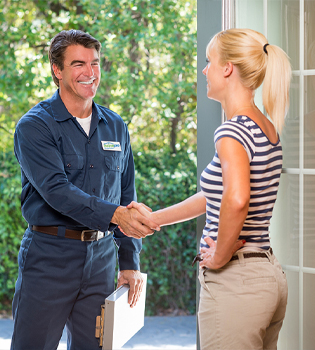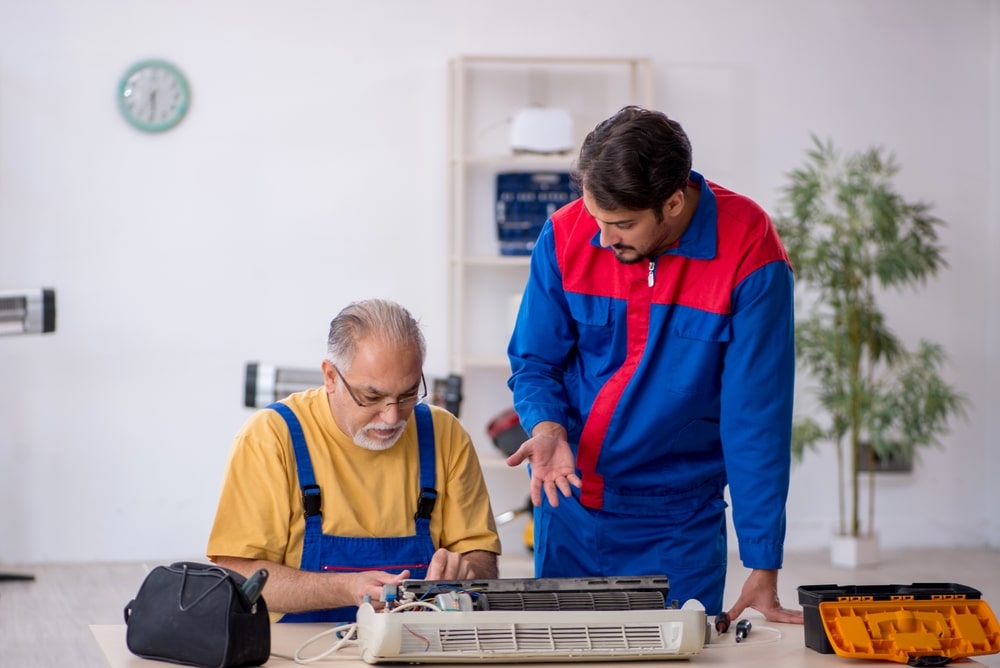
An HVAC system can develop air conditioning problems. This includes tripped circuit breakers, low refrigerant levels, loose wiring, a frozen evaporation coil, a damaged condenser coil, and several other issues. Some of these issues can be fixed without the help of an HVAC professional. However, it’s always a good idea to have routine AC tune-ups done to prevent any issues. On this page, we have shared air conditioner troubleshooting tips to help you restore the performance of your air conditioning system.
The Most Common Problems and How to Troubleshoot Them
The AC Won’t Turn On
One common AC unit problem is that it will not turn on, and there can be many reasons why it ceases to function as expected, such as a thermostat malfunction. For example, the thermostat batteries may be dead. There could also be an issue with the temperature sensor.
A completely clogged air inlet could also prevent the HVAC system from starting by blocking the airflow and freezing the components. Another reason the air conditioning won’t turn on is an issue with the circuit breaker. The HVAC unit may have tripped, not allowing it to turn on.
Solution:
- Check the batteries of the thermostat and clean the sensors. Dirty sensors can cause the thermostat to malfunction.
- Clean the air filter.
- Flip the circuit breaker back on and wait around 30 minutes before turning the air conditioner on.
Malfunctioning Thermostat
It is common for a thermostat to experience problems. The cause behind a thermostat malfunction could be as minor as incorrect installation or a major issue such as broken sensors.
A thermostat can also accumulate a lot of dirt and debris that hinder its performance. Since the thermostat is the control center for the HVAC system, its malfunction can affect the entire unit.
Solution:
- Turn off the power supply, and unmount the thermostat. Change its location if placed near a heat source and ensure to level the thermostat before you remount it on the wall.
- Remove the thermostat cover and clean it.
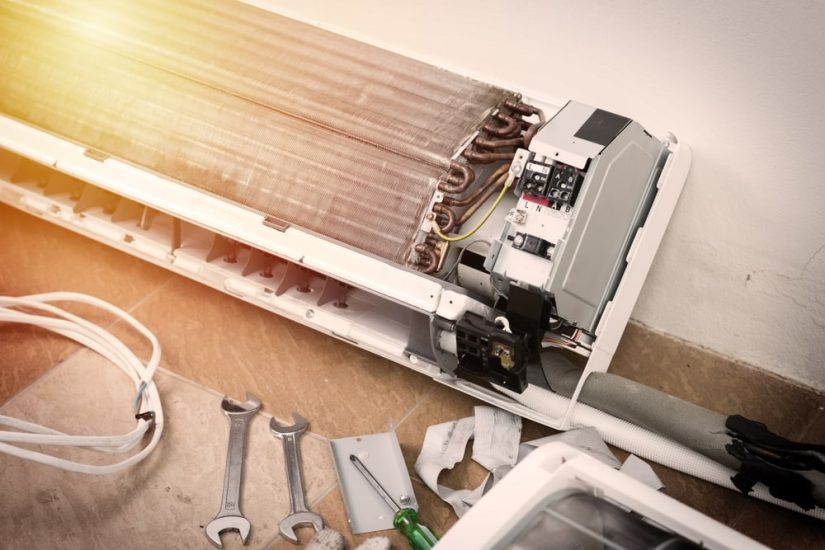
Air Conditioner is Not Cooling Properly
The AC system not cooling your home as it should can be frustrating. The cooling coils that absorb the heat inside your house and expel it outside might be dirty, frozen, or leaking, which causes this problem. Another reason could be that the compressor is defective, and the HVAC unit can not absorb heat properly. If the supply vents are obstructed, they won’t allow the air conditioner to work properly.
Solution:
- Try cleaning the coils in the condensing unit outside.
- Check the refrigerant level, as you might need to recharge the AC.
- Check if the compressor is turning on. If not, that could be why the AC only blows hot air.
- Remove any objects obstructing the air vents.
AC Overcooling
The air conditioning overcooling your house might not seem like a problem, but it can spike your energy bills. One reason why this happens is the thermostat is too close to a heat source, such as a lamp or an electrical object. This confuses the temperature sensor.
A faulty blower fan could also be the source of the problem. Blower fans supply warm air from your rooms to the evaporator coils to cool it down, but if the coolant traps the heat, it can prevent condensation. This leads to the AC unit overcooling the room.
Solution:
- Remount the thermostat away from any heat sources.
- Try cleaning the blower fan to fix the issue.
Frozen Evaporator Coils
The evaporator coil in an HVAC system handles the heat exchange process and allows the unit to heat or cool the room. Freezing of the evaporator coil is one common issue seen in HVAC units that prevent the entire system from functioning properly and blowing cool air.
Solution:
- Run the air conditioning on fan-only mode to thaw the evaporator coil and clean all coils and filters before turning it back on. If the coils are damaged, you are going to need AC repair or replacement service.
- Check the air filter; if needed, clean it by gently washing it and let it dry before reinstalling it. Dirty air filters can cause performance and efficiency issues.
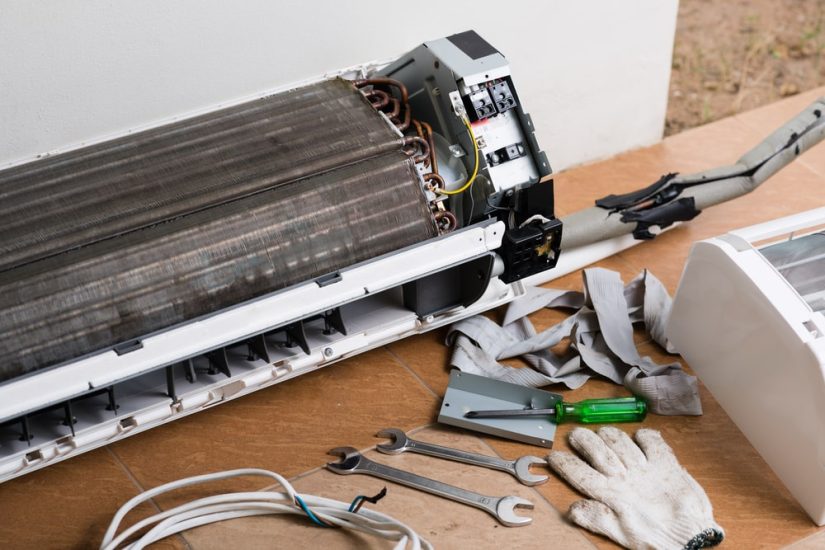
Outdoor Fan Not Working
The outdoor fan, also known as the condenser fan, is responsible for expelling hot indoor air into the outside environment. If it stops working, it can cause several issues in the entire air conditioner system. Common reasons why the condenser fan does not work could be the capacitor overheating, the contractor not providing enough voltage to the fan, a burnt-out motor, o damaged bearings.
Solution:
- Try jump-starting the capacitor by propelling the fan with the stick.
- If the compressor does not work, switch off the unit and turn it back on.
AC Making Irregular Sounds
Air conditioners can be loud at lower temperatures and make clicking or whooshing sounds when turned on. However, frequent, irregular, excessively loud noises are not normal.
For instance, if you hear a popping or cracking noise for the first time, it could mean that your system is going to fall.
There can be other sounds indicating a problem with the air conditioning, including the following:
- Banging due to a faulty compressor
- Vibration caused by loosened screws
- Frequent clicking because of an electrical fault
- Air leaks causing a light hissing.
Solution:
- For a vibration hum, you can easily open the unit and fasten any loose screws, but other sounds could be an indicator of a bigger problem that requires a qualified technician. While you inspect the noises, it is best to minimize air conditioning use.
- Clean the air filters.
Unusual Smells Coming from the AC
Unusual odors coming from the AC are abnormal and indicate a problem that needs to be fixed as soon as possible. For example, a burning smell coming from an air conditioner when it is turned on could be a sign of a serious mechanical problem with the motor, compressor, or wiring within the HVAC system.
Sometimes a refrigerant leak can cause the air conditioning unit to smell like chemicals. Also, people who live in highly humid environments can experience musty odors due to mold growing inside the unit.
Solution:
- If you smell a musty odor, you can try cleaning the coils or the drip pan to eliminate the mold.
- If a solvent is placed near the air conditioning, it could be diffusing a smell from the solvent into the air. Move any liquid with a pungent odor away from the unit to fix the issue.
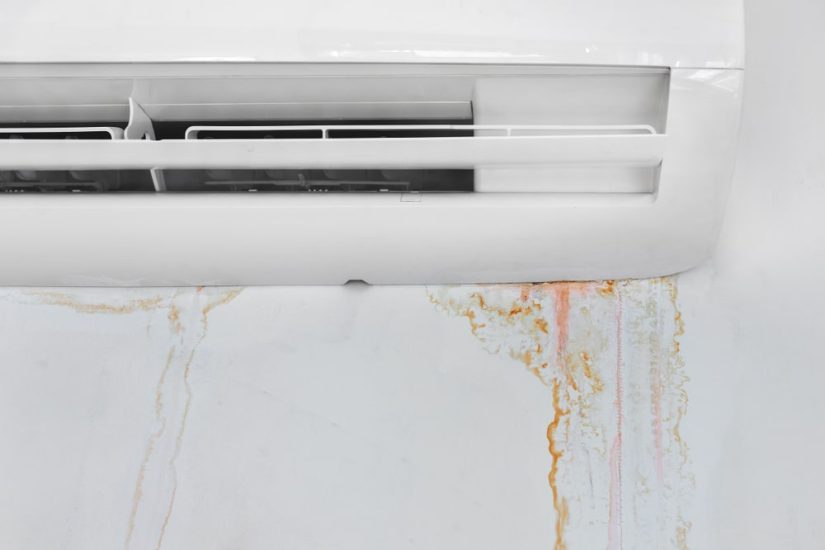
Leakage Around the AC
Another common problem in air conditioners is leaking. While this may not affect the HVAC system’s function in the short term, it can damage walls or furniture. A broken condensation pump or a rusted drain pan can cause this issue.
Solution:
- Replace the broken condensate pump.
- Replace the rusted drain pan.
- Clean the air filters.
Air Conditioner Troubleshooting Chart
Source: US Energy Information Administration
Source: Infographic Website
When to Contact an HVAC Contractor?
If you are not able to repair the air conditioner yourself, allow a professional to have a look. Any unusual odors or noises from the air conditioning unit are not normal, so you should not ignore those signs. Not only would you continue to get poor performance from the air conditioner, you can also get high energy bills or create an unsafe environment.
While most AC problems can be easy to troubleshoot, a contractor has the tools and skills to repair, replace, or install a faulty AC component. In addition, a technician can inspect other parts of the AC and guide you on if any other service is needed or expected to be needed in the near future.

